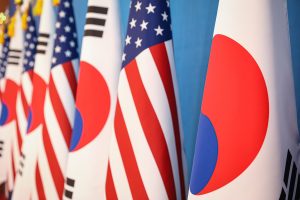Sung Kim, the U.S. special envoy for North Korea, visited South Korea on Saturday to discuss efforts for the denuclearization of North Korea with his South Korean counterparts.
It is Kim’s second visit to Seoul as a special envoy for North Korea, after having an in-person meeting with his South Korean counterparts in June to introduce the Biden administration’s North Korea policies and deliver messages to his counterparts in South Korea and North Korea.
On Monday morning, at the beginning of the meeting with his South Korean counterpart Noh Kyu-duk, Kim said that he is grateful to have an opportunity to engage with his counterparts in the South Korean government at this important time.
“I think my visit here is another indication of Washington’s determination to maintain the closest possible cooperation with the Republic of Korea government on all issues related to North Korea,” he said in the meeting.
South Korea-U.S. joint military exercises have been underway since August 16, despite North Korea’s warnings. From Seoul, Kim re-emphasized Washington’s stance on the allies’ joint exercises by saying that “the U.S. has no hostile intent toward North Korea and military exercises are purely defensive.”
Along with common security issues, Kim and Noh discussed the two countries’ possible humanitarian assistance to North Korea through international organizations such as United Nations, although the North has consistently refused to receive assistance from them since bilateral talks between Washington and Pyongyang stalled in 2019.
Kim, who is a veteran diplomat dealing with North Korea issues, once again conveyed messages to his North Korean counterparts via a one-on-one interview with Korea Broadcasting System (KBS) on Monday. In the interview, Kim said that he is willing to sit down with his North Korean counterparts “anywhere, anytime without preconditions” and urged Pyongyang to re-engage in dialogue to negotiate its denuclearization.
“I really do believe that there is an opportunity to make a serious progress with the DPRK. So I hope I would be able to sit down with my DPRK counterparts soon,” Kim said in an interview with KBS, referring to the formal name of North Korea.
Responding to Pyongyang’s threats over the joint military exercises, Kim said there is no reason for concern about the joint military exercises and emphasized that “the U.S. has no hostile intent towards the DPRK.”
Kim Yo Jong, sister of the North Korean leader Kim Jong Un, previously warned that North Korea would take actions to respond to the joint military exercises. Special Envoy Kim said the U.S., in partnership with South Korea and other countries, will respond appropriately if there is any provocation from North Korea. He also said that the U.S. commitment to protect the South’s security is “sacred” and there would be no change in the U.S. commitment to defending South Korea.
Washington has been clear that the joint military exercises are purely defensive, but North Korea has kept accusing both Washington and Seoul of preparing for another Korean War by conducting military exercises. Pyongyang has not been responding to renewed outreach from Washington and Seoul.
Some experts predicted that the South Korean government might be able to discuss North Korea policies with both Kim and Russian Deputy Foreign Minister Igor Morgulov, as he also arrived in Seoul on Saturday and is having meetings with his South Korean counterparts. Kim said he is going to meet with Morgulov during his visit to Seoul; however, Kim made clear that the United States is now focused on the North Korea-U.S. bilateral agreement and has no plan to resume any multilateral efforts at the moment.
Morgulov also had a meeting with Noh on Tuesday to discuss the permanent denuclearization and peace settlement on the Korean Peninsula. The two sides agreed on the importance of removing tensions in the Korean Peninsula and neighboring regions by renewing dialogue among related countries.
Cheong Seong-chang, a senior fellow at the Sejong Institute think tank in South Korea, told The Diplomat that the North Korea-U.S. negotiations during the Trump administration clearly demonstrated that direct talks between the two sides have clear limits, even if it is necessary for progress in the denuclearization of North Korea.
“The United States and North Korea have a very great difference … on measures that North Korea needs to take for denuclearization and corresponding measures of the international community,” Cheong said.
Cheong added that it is necessary for South Korea and China to be arbitrators between the U.S. and North Korea to reach an agreement at the moment. Also, he added that China’s cooperation is essential to bring Pyongyang back to the negotiating table as it is the biggest trading partner of the North.
After a policy review on North Korea, the Biden administration announced that it will pursue “a calibrated and practical” approach on North Korea issues. Experts have different views and predictions about its efficacy. As North Korea now demands the withdrawal of U.S. troops in South Korea and a halt to joint military exercises between the U.S. and South Korea, the United States would find it difficult to bring North Korea back to the negotiating table if it consistently urges the North to take productive steps toward denuclearization.
“The primary reasons dialogue has been stalled are that the Kim regime is not interested in denuclearization and has been paranoid about any contact that could be a vector for coronavirus into the country,” Leif-Eric Easley, associate professor of international studies at Ewha Womans University in Seoul, told The Diplomat.
Easley added that “if North Korean domestic politics reduced reliance on narratives of external threat, relations could be transformed via staged denuclearization and economic cooperation.”

































